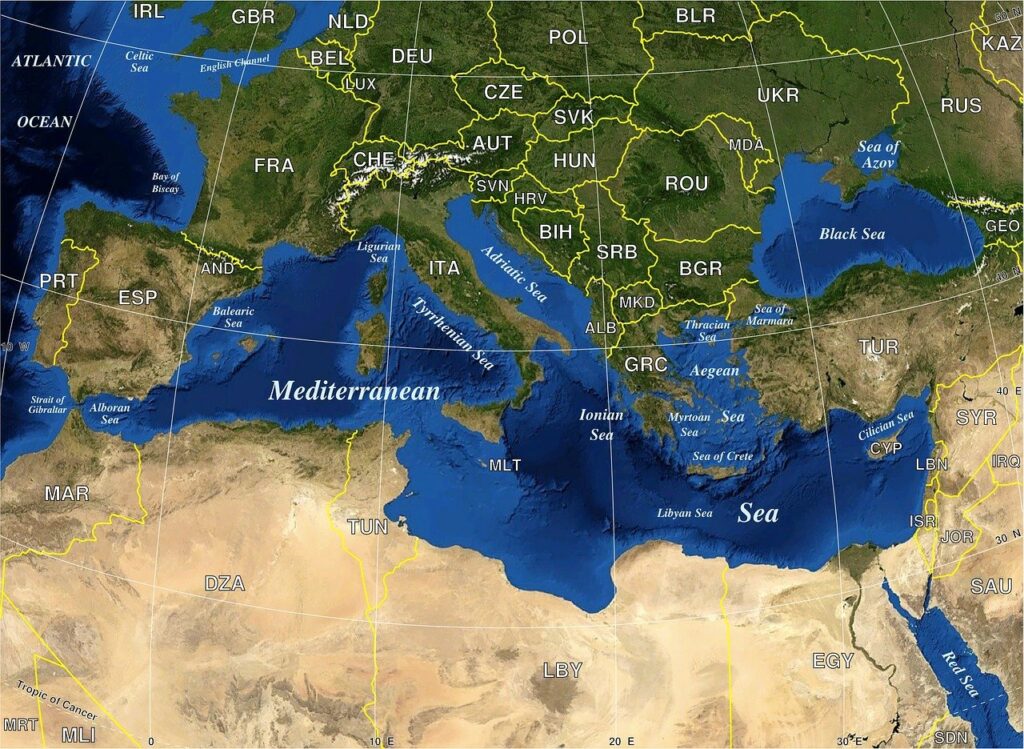A recent dispute between Greece and Turkey over oil and gas drilling rights in the Eastern Mediterranean Sea has led the two nations to the brink of violence, reviving their decades-old mutual hostility and potentially fracturing the NATO alliance.
The escalating tensions between Greece and Turkey began in late July, after Turkey announced a drilling ship would explore an area of the Eastern Mediterranean between the Greek and Turkish mainlands, which is dotted with Greek islands. This area has long led to overlapping maritime claims by Greece, Turkey and Cyprus. Backed by the European Union and the United States, Greece has defended its control over the area by claiming that its islands generate undersea continental shelves, giving it the sole right to conduct exploratory drilling for oil and gas. Turkey, on the other hand, reasons that tiny Greek islands just off the Turkish coast should not entail sole Greek maritime jurisdiction. The two NATO members risk disrupting the alliance if this dispute escalates into a serious conflict.
The Eastern Mediterranean has been a source of various gas field discoveries over the past decade. In 2010, Israel discovered the Leviathan field, which contains over 450 billion cubic meters of gas reserves. In 2015, the Italian company Eni discovered Zohr, one of the world’s largest natural gas fields off the Egyptian coast. And, in 2018, yet another huge gas field was discovered off the coast of Cyprus. The region’s vast gas deposits are estimated to be around 3.5 trillion cubic meters, which is equivalent to the U.S. natural gas consumption for approximately half a decade. Tensions are mounting over these discoveries, as Turkey is demanding fair access to exploration and drilling rights.
Hostility between Greece and Turkey is nothing new. The two countries have been political and military rivals since the days of the Ottoman Empire. In 1830, Greece gained its independence from the Ottomans in a decade-long war after nearly 400 years of oppressive rule. More recently, the two nations came to blows again in the 1974 Turkish military invasion of Cyprus, which is inhabited by both ethnic Greeks and Turks. To this day, Cyprus is split between the ethnic Greek Republic of Cyprus in the south and the Turkish Republic of Northern Cyprus, which is only recognized by Turkey. No peace treaty has ever been signed.
Since earlier this year, Turkey has been provoking Greece through aggressive actions, such as encouraging migrants to breach the Greek border and converting the Hagia Sophia in Istanbul from a museum to a mosque, which has outraged Eastern Orthodox Greeks. Hagia Sophia has been a point of contention between the Greeks and Turks for centuries. The historic building was built 1,500 years ago as an Orthodox Christian cathedral but was altered to become a mosque after the Ottoman conquest of Constantinople (now Istanbul) in 1453. Now, having had a middle ground for Haga Sophia, relations have regressed.
Last year, Turkey signed an agreement with Libya to create an Exclusive Economic Zone (EEZ) between Turkey’s southern shore and Libya’s northern coast, giving Turkey the rights to waters off Crete and other Greek islands. Both Egypt and Greece refused to recognize the agreement, as they claimed it completely ignored Crete’s maritime jurisdiction. In early August, Greece responded with its own accord with Egypt, which annulled the Turkey-Libya deal and unraveled any chance of peace talks with Turkey.
On August 12, things took a turn for the worse. Just days after Turkey sent out the exploratory vessel with a naval escort to explore contested waters, one of the escort ships collided with a Greek frigate, which was patrolling Greece’s EEZ in the area. The collision was perceived by Greece and its allies as an act of Turkish aggression and marked the worst confrontation between the two NATO allies since a 1996 faceoff that nearly led to war.
Turkish President Recep Tayyip Erdogan has justified his government’s actions based on his Blue Homeland doctrine, a revanchist foreign policy that legitimizes Turkish drilling in the Eastern Aegean Sea. Just as other nations in the region have increased their energy output due to nearby drilling efforts, Turkey also aims to become a regional energy hub through the use of its Trans-Anatolian Natural Gas Pipeline (TANAP). Gas from the Eastern Mediterranean is the ideal solution for Ankara as the region sits away from Russian influence, the major producer of natural gas in Eurasia.
Yet, Turkey stands alone in its energy pursuits. Other nations in the region have snubbed Turkey from recent energy dealings. In January, Greece, Cyprus and Israel signed a deal for the EastMed project, a proposed 1,900 km (1,180 mile) subsea pipeline to carry natural gas from the eastern Mediterranean to Europe. Turkey has blasted the idea by dismissing the need for the EastMed pipeline, as TANAP already exists, and by pointing out that this new pipeline ignores Turkey’s rights over natural resources in the Eastern Mediterranean.
Athens is actively preparing for all possibilities, including military intervention. On September 12, Prime Minister Kyriakos Mitsotakis announced a large arms buildup, including the purchase of French-made warplanes, the recruitment of 15,000 new troops and increased investment into the national arms industry. Mitsotakis is believed to have negotiated the buildup after talks with French President Emmanuel Macron during a recent summit. Macron has been one of Athens’ strongest supporters throughout this dispute and has warned Erdogan not to cross “red lines”. Macron has insisted that Europe needs “a more united and clear voice” on Turkey which is “no longer a partner”.
Erdogan has not backed down from the standoff, declaring in a recent televised speech, “Don’t mess with the Turkish people. Don’t mess with Turkey.” He has initiated his own military buildup, aiming to restore Turkish naval prowess in the region, like in the days of the Ottoman Empire. The buildup includes new submarines, fleet replenishment and a small aircraft carrier. This investment is expected to significantly boost the Turkish navy’s capabilities in both the Aegean and the Mediterranean seas. Beyond preparing for a possible conflict with Greece, analysts say restoring past maritime power could open the door to untapped electoral support for Erdogan, leading many to question his true motives behind the buildup.
The need to de-escalate the tensions is urgent. The EU has asserted its intentions to step into the dispute, yet its member states remain divided as to the methods the supranational organization should employ to diffuse the situation. The EU stands firmly in support of Greece and Cyprus, which are both member states, while Turkey is not. Germany, which holds the EU’s rotating presidency, is willing to present incentives to Turkey in return for de-escalation and has advocated for Greece and Turkey to engage in peace talks. While Germany’s position has support from both Spain and Italy, France, Greece and Cyprus favor a tougher stance against Turkey, advocating for new sanctions on Ankara.
On October 1, EU leaders met at the Special European Council and reiterated its full solidarity with Greece and Cyprus. They stated that, in the event of renewed unilateral provocations by Turkey in breach of international law, the EU will use all options at its disposal to defend its interests and those of its member states. The European Council will revisit the situation in the Eastern Mediterranean at its meeting in December 2020.
If the EU is not able to effectively de-escalate the dispute, military conflict between Turkey and Greece could ensue, thereby threatening the strength of the NATO alliance. In the history of NATO, no member country has ever attacked another member, and there are no formal rules dictating how to handle a conflict between members. Thus, military conflict between Turkey and Greece could result in chaos, thereby weakening the NATO alliance and weakening its legitimacy and collective security.







